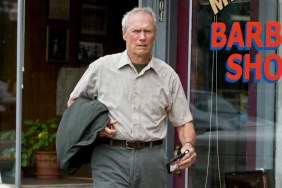
I was doing a little film re-watching this weekend and popped in my HD DVD copy of John Ford’s The Searchers and about midway through I was slapping myself in the head for not thinking of this John Wayne classic when I was reviewing Clint Eastwood’s Gran Torino. The two films obviously aren’t exactly alike, but the comparison between the two protagonists (or are they antagonists?) is undeniable.
However, before I went forward with this quick commentary I decided to hit up Google and see how many original reviewers of Torino mention a comparison to Searchers – if any – and I was surprised to find only a small handful, but I was reassured in the growing community of online critics considering none of the examples I found came from newspaper critics.
Bill Weber at Slant Magazine gave it a short mention as did Nick Schager at Cinematical and Cynthia Fuchs at PopMatters. I did find many turned to Wayne’s True Grit for comparison (understandable) as well as Dirty Harry for obvious reasons, but I don’t think you can look any further than The Searchers if you are looking for a true comparison.
Like Eastwood’s Walt Kowalski in Gran Torino, Wayne’s Ethan Edwards in The Searchers is a war veteran (Civil War to be exact) who comes home with plenty of hatred in his heart. In Torino Walt has lost the love of his life and in The Searchers Ethan is either too shy or modest to admit his love for his. Walt has a hatred for almost everyone in Torino and prominently on display is his hatred for Asians. Ethan’s hatred for Native Americans is hard to miss as he returns home and meets Martin Pawley (Jeffrey Hunter) – a young boy he once saved – and says, “Hell, I could mistake you for a half-breed.” Martin tells him he is “one-eighth Comanche,” but it is obvious even one-one-hundredth would be too much.

Both carry a wealth of racial slurs in their satchel on their way to some form of redemption. However, if Torino had ended as The Searchers did I think I would have had a much better reaction to the film than I spelled out in my review.
BEWARE, SPOILERS FOR THE END OF BOTH FILMS FOLLOWS
In The Searchers Ethan sets out with Martin in an effort to find the Native Americans who killed his family and kidnapped two of the girls (Lucy and Debbie). Along the way we find Debbie wearing traditional Comanche dress and this is where Ethan’s racism comes to the forefront as he no longer intends to save her. He tells Martin she’s become “the leavin’s of a Comanche buck” and in his eyes that’s just not acceptable. So, at the end of the film John Ford has built up this rabid tension in which the audience is unsure as to whether Ethan is going to kill Debbie or save her as he chases her through the rocks. Of course, he saves her, much how Walt “saves” Thao and his family in Gran Torino.
However, Walt’s sacrifice in Gran Torino was his life and I think his death built up unearned sympathy for the character. Sure, Walt had regret for what he did in the War, but he carried his regret along with his hatred. One could argue cause and effect for certain and I wouldn’t necessarily disagree with you, but comparing it to the end of The Searchers – Ford could have easily had Ethan die of a gunshot, arrow or whatever pleased him, but where is the conflict in that? Instead we got the iconic shot of Ethan outside the doorway and not a part of the merriment. This could be looked at a myriad of ways as Martha (Ethan’s lost love) is now dead so he has nothing left there, or as he looks in at a family accepting a “one-eight Comanche” and the woman that’s become “the leavin’s of a Comanche buck” and he now realizes he doesn’t fit in. Either way his ideals and outlook on life don’t belong and he is seen walking off into the wild as the film ends.
The difference between this ending and Torino‘s ending is that while both Walt and Ethan were able to change for one brief moment in their lives we never truly believe they have actually changed. As the saying goes, you can’t teach an old dog new tricks. Essentially they are a dying breed and either unwilling or unable to change, but most importantly, they won’t change.
Ethan is a far more sympathetic character because he is still alive as he walks off – alone with his thoughts and his feelings. On the other hand, Walt is dead and the last time we see him, we see him sacrificing himself for an Asian family – it’s a hero shot for sure, but has he truly earned it? While I can applaud Walt’s efforts in Torino I don’t have any sympathy for him, he chose the easy way out by more-or-less committing suicide. Had he tried another way, a way in which he lived and had to confront his own demons wouldn’t that been more hero-like? Much more worthy of our sympathy?
Ethan is going to live with what he is and for that I can feel sorry for him and even try to drum up some level of sympathy, even if it only comes out of me in the form of pity.











